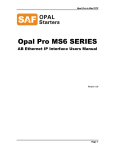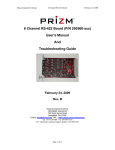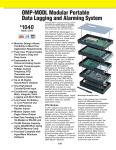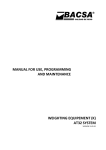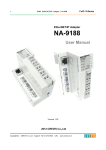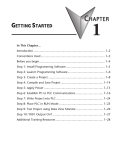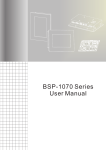Download This is a title page
Transcript
Opal Pro to Mod TCP Opal Pro MS6 SERIES Mod TCP Interface Users Manual Revision 1.02 Page 1 Opal Pro to Mod TCP Page 2 Opal Pro to Mod TCP FOR YOUR SAFETY Only qualified personnel should install this equipment, after first reading and understanding all the information in this manual. All instructions should be strictly adhered to. The user should consult Brock Solutions or a SAF OPAL Starters supplier for clarification of the contents of this manual should any doubt or questions arise. The installation of this equipment must be conducted in accordance with all national, regional and local electrical codes. All drawings and technical representations included in this manual are for typical installations and should not in any way be considered for specific applications or modifications. Consult SAF OPAL Starters for supplemental instructions. Brock Solutions Inc. accepts no liability for any consequences resulting from inappropriate, negligent or incorrect installation, application or adjustment of this equipment. The contents of this manual are believed to be correct at the time of printing. In following with our commitment to the ongoing development and improvement of our products SAF OPAL Starters reserves the right to change the specification of this product and/or the content of this instruction manual without notice. Page 3 Opal Pro to Mod TCP Page 4 Opal Pro to Mod TCP Table of Contents INTRODUCTION .............................................................................................. 6 HARDWARE .................................................................................................... 6 JUMPER SETTINGS........................................................................................ 6 LED INDICATORS ........................................................................................... 7 OPAL PRO PARAMETER SETTINGS ............................................................ 8 I/O CONFIGURATION.................................................................................... 10 Page 5 Opal Pro to Mod TCP Opal Pro to Mod TCP Introduction The Opal Pro can be monitored and controlled over a EtherNet communication network using the Mod TCP protocol. The Opal Pro connects to the Ethernet network through and optional Ethernet card that is mounted on the main Opal Pro control card (CA530). Access is gained to the Ethernet card via the communication opening on the right side of the Opal Pro. The Opal Pro is a Mod TCP Slave and responds to a Mod TCP scanner’s requests. Hardware Connection is made via a 10Mbaud Ehernet port which utilizes a RJ45 connector. Connection should be made using CAT 5 cable. Jumper Settings Jumper J3 J4 Page 6 Setting Not installed Installed on pins 1 and 2 Description Boot Block write enable Disable test mode Opal Pro to Mod TCP LED Indicators Two bi-colour (red/green) LED indicators are mounted beside the network connector. The upper LED indicates the Ethernet interface card status. LED State OFF Flashing Red Solid Red Flashing Green Solid Green Amber (Red/Green) Ethernet Interface Card Status No power Recoverable configuration fault (card is not configured, contact Brock Solutions for support) Hardware Error (contact Brock Solutions for support) No errors client interface is not open ( check software firmware version of Opal Pro) No errors (normal operation) Configuration Mode (card is not configured, contact Brock Solutions for support) The lower LED indicator indicates the Ethernet Network status. LED State Ethernet Network Status OFF Network interface offline, No network power Flashing Red I/O connection in timed-out state or other Recoverable fault Flashing Green Device in online but has no connections Solid Red Unrecoverable fault Solid Green Online with established connections Amber Device is in Communication Faulted state and (Red/Green) responding to an Identify Communication Faulted Request Page 7 Opal Pro to Mod TCP Opal Pro Parameter Settings The parameters in the Opal Pro used to configure the Ehernet interface card (group 14) are only accessible if a Ethernet interface card is installed. The parameter settings are as follows: Opal Pro Setting Description Parameter 2.02 Comm Module Ethernet Type of interface card installed (read only) 10.01 Start/Stop Comm This allows the Opal Pro to be Module started and stopped over the communication link 10.04 Iref Source Comm If this is set to Comm Module the Module Opal pro will follow the Current refernce from the communication link. If there is no reference being sent on the communication link this should be set to “Internal” 10.05 Phase Angle Comm If this is set to Comm Module the Source Module Opal pro will follow the Phase Angle reference from the communication link. If there is no reference being sent on the communication link this should be set to “Internal” 14.07 Node 1 – 254 This is the Node # of the slave Opal Pro 14.08 IP Addr 1 0-255 First number in the IP address of the Opal Pro 14.09 IP Addr 2 0-255 Second number in the IP address of the Opal Pro 14.10 IP Addr 3 0-255 Third number in the IP address of the Opal Pro 14.11 IP Addr 4 0-255 Fourth number in the IP address of the Opal Pro. (the node number as set in 14.07 is added on to this number to get the final IP address) 14.12 SubNet 1 0-255 First number in the SubNet Mask 14.13 SubNet 2 0-255 Second number in the SubNet Mask 14.14 SubNet 3 0-255 Third number in the SubNet Mask 14.15 SubNet 4 0-255 Fourth number in the SubNet Mask Page 8 Opal Pro to Mod TCP 15.04 Comm Fault Enable Disable 15.05 Comm Fault Time 0.1 to 5.0 secs Enable – Opal Pro trips out on a communication fault Disable – Nothing happens on a communication fault This is the time setting that the Opal Pro uses to detect a communication fault. Bit 15 of the command word must change state twice with in the time set in this parameter. If parameters in group 14 are modified the changes do not take effect until the control power for the Opal Pro is turned off and then back on again. Page 9 Opal Pro to Mod TCP I/O Configuration The Opal Pro supports 4 input words and 51 output words. Their description is as follows: Input Modbus Name Description Words Register (Polled) Word 1 40001 Command Bit 0 – Run Command Bit 1 – Jog Command Bit 2 – Reverse Command Bit 3 – Reset Command Bit 4 – DCI/Soft Stop Enable Bit 5 – Reserved Bit 6 – Reserved Bit 7 – Reserved Bit 8 – Reserved Bit 9 – Reserved Bit 10 – Reserved Bit 11 – Reserved Bit 12 – Reserved Bit 13 – Reserved Bit 14 – Reserved Bit 15 – Watch Dog bit (this bit must change at least twice in the time set by parameter 15.05) Word 2 40002 Current 0 –1000, 833 = 500% of Motor Reference Current set in parameter 13.01 Word 3 40003 Phase Angle 0 – (0.5 * Line Freq Cycle time in Reference usec) ie: 60 Hz 0 – 8333 Word 4 40004 Reserved Page 10 Opal Pro to Mod TCP Output Words (Polled) Word 1 Modbus Register Name Description 40001 Status Word 2 40002 Word 3 40003 Parameter 1.01 1.02 Modbus Register 40004 40005 Current Feedback Phase Angle Actual Name Bit 0 – Ready to Run (drive is enable and has 3 phase power) Bit 1 –Running (start is regulating) Bit 2 – Full On (starter is phased fully on) Bit 3 – Up to Speed (started is phased fully on and the current is below 105% of nameplate current as set in 13.01) Bit 4 – Reverse Bit 5 – Jogging Bit 6 – DC Injecting Bit 7 – Faulted Bit 8 – IOC Fault Bit 9 – MOL Fault Bit 10 – Phase Loss Fault Bit 11 – Shear Pin Fault Bit 12 – Shorted SCR Fault Bit 13 – Heat Sink OT Fault Bit 14 – Reserved Bit 15 – Watch Dog Bit 833 = 500% of motor name plate current as set in 13.01 Amount of time phased on in microseconds Description 1.03 40006 1.04 40007 1.05 40008 Current L1 to L2 Voltage L1 to L3 Voltage L2 to L3 Voltage DI Status 1.06 40009 Analog Input Current feedback in Amps Line 1 to Line 2 Voltage in Volts Line 1 to Line 3 Voltage in Volts Line 2 to Line 3 Voltage in Volts Digital input status Bit 0 – Start Bit 1 – Stop Bit 2 – Jog Bit 3 – Reverse Bit 4 – Reset Analog input value in Volts X 100 Page 11 Opal Pro to Mod TCP 1.07 40010 1.08 2.01 2.02 40011 40012 40013 2.03 40014 10.01 40015 10.02 10.03 10.04 40016 40017 40018 10.05 40019 10.06 40020 10.07 40021 10.08 11.01 40022 40023 11.02 40024 11.03 40025 11.04 11.05 40026 40027 Page 12 Relay Status Status of the Relay Outputs Bit 0 – Running Bit 1 – By-Pass Bit 2 – Shorted SCR Bit 3 – Reverse Bit 4 – Faulted Analog Output Analog Output value in Volts X 100 Stack Size Opal Pro Stack Size in Amps Comm 0 – None Module Type 2 – Ethernet Firmware Opal Pro Firmware Version x 100 Version Start/Stop 4 = 2 Wire Control 5 = 3 Wire 6 = Comm Module Ramp Time Time is seconds Step Current In % of nameplate current Current 7 = Internal Reference 8 = Analog Input 9 = Comm Module Phase Angle 10 = Internal 11 = Analog Input 12 = Comm Module Jog Accel In % of nameplate current Current Limit Jog Current In % of nameplate current Limit Jog Ramp Time is seconds x 10 Stop Mode 13 = Coast 14 = Soft Stop 15 = DC Injection Soft Stop In % of incoming line voltage Step Soft Stop Time in seconds Ramp DCI Current In % of nameplate current DCI Time Time in seconds Opal Pro to Mod TCP 12.01 40028 13.01 13.02 13.03 40029 40030 40031 14.01-14.06 14.07 14.08 14.09 14.10 14.11 14.12 14.13 14.14 14.15 15.01 40032-40037 40038 40039 40040 40041 40042 40043 40044 40045 40046 40047 15.02 40048 15.03 40049 15.04 40050 15.05 40051 Analog Output 16 = Current Reference 17 = Current Feedback 18 = Overload level 19 = Phase Angle Motor Amps Motor nameplate current in Amps Motor Volts Motor nameplate volts in Volts Service Motor nameplate service factor x 100 Factor Reserved Node Number 1 – 254 IP Address 1 0 – 255 IP Address 2 0 – 255 IP Address 3 0 – 255 IP Address 4 0 – 255 SubNet 1 0 – 255 SubNet 2 0 – 255 SubNet 3 0 – 255 SubNet 4 0 – 255 Shear Pin Flt 34 = Enabled 35 = Disabled MOL Fault 36 = Disabled 37 = Class 10 37 = Class 15 37 = Class 20 37 = Class 30 Overload In % Level Drive trips at 100% Comm Fault 41 = Enabled 42 = Disabled Comm Flt Time in seconds x 10 Time NOTE: The Opal Pro must have firmware version 1.63 or higher. Page 13













